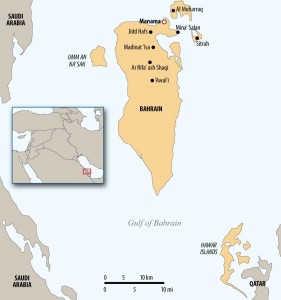Bahrain Rally Reiterates Protesters’ Demand
By Arab News
By Siraj Wahab
Tens of thousands of Bahrainis demanding change in the way they are governed marched peacefully on Friday evening from near and far to converge on the now-famous Pearl Roundabout.
The protesters were being largely led by opposition parties, particularly the main Al-Wefaq.
The protesters, who are demanding that the entire government led by Prime Minister Prince Khalifa bin Salman be sacked, shouted slogans and carried placards that denounced government high-handedness, lack of human rights and lack of housing, jobs and health care facilities.
However, the one slogan that was repeatedly raised and that was met with instant and uproarious response from the protesters was about Sunni-Shiite unity. “There is no Shiite, no Sunni; we all are together,” the protesters chanted in unison.
The government, which appeared uneasy earlier in the day, breathed a sigh of relief at the peaceful demonstrations. Authorities and the security forces were on edge Friday because of a few violent skirmishes between pro-government and anti-government factions on Thursday night in Madinat Hamad, about 15 km from the Pearl Roundabout.

Swords were used during the clashes forcing the security officials to issue a high alert. On Friday the protesters seemed well organized with hundreds of them waving the red-and-white Bahraini flag. Men and women of all ages and even children were seen in large numbers. However, the most enthusiastic among the protesters were the youngsters. They seemed excited with their new-found freedom to air grievances.
“I am here to demand change,” said Latifa Akberi, a 23-year-old management student. “I am not alone. Every single friend of mine is part of this movement. Our parents are here; our brothers are here. We want to be heard, and I guess the message is getting across that we the people can no longer be taken for granted.”
Her brother, Ali, was even more vociferous. “This government should go,” he said. “That is our primary demand. If that does not happen then we will continue to march on this roundabout till such time our demands are met.”
In particular, Ali decried discrimination against Shiites in government services. As far as the eye could see, the main road leading to Pearl Roundabout was a sea of people. Men and women maintained separation during the march with women using one traffic lane and men using the other.
Businessman Jaffer Hussain, who was watching the protest from one of the pedestrian bridges and waving the Bahraini flag, said the protesters have been very careful not to raise any slogans against King Hamad bin Isa Al-Khalifa.
“They are primarily going after the prime minister who is seen by anti-government protesters as a source of all troubles,” he said. In his estimate, Friday’s rally was by far the biggest, but some independent observers disagreed. “There have been bigger rallies than this one since the protests broke out three weeks ago,” said one local journalist.
One major reason for the peaceful march was the exhortation by senior opposition cleric Sheikh Isa Qassim to abhor violence. In his Friday sermon, he warned his followers not to indulge in any kind of violence. “It is against our religion, it is a crime against humanity,” he said.
Meanwhile, the rest of Manama looked normal with people going about their daily tasks. What is missing is the usual throng of GCC visitors — both citizens and expatriates. Tourism-related businesses are taking a hit.
Some international conferences have been canceled along with the island’s Formula One race.
Clearly the food and hospitality industry awaits a quick resolution to the protests and a return of the nation’s most important revenue streams.
The government may have heaved a sigh of relief Friday at the peaceful passage of the rally, but its real test will begin in the next few days when it sits down with the opposition parties to negotiate a way out of the impasse. The people have drawn immense strength from the street power. They have been clearly inspired by successful people’s revolutions in Tunisia and Egypt. Anything that does not meet their expectations will only send them back to the roundabout in greater force.
From the government’s point of view, any concession at this stage may only embolden the protesters and may lead to further intensification of the street protests. Using force to tackle the protesters last week boomeranged on the government with tragic loss of lives. That further incensed and galvanized the protesters. The government is being careful not to further agitate the protesters.
Some leaders of the opposition parties praised the government for its judicious handling of the protests. They said the government has exercised restraint, which has been well-received by the protesters; however, they said they would not relinquish their primary demand to sack the government.
“We are ready for a dialogue and have submitted our recommendations to the crown prince,” said Ibrahim Shareef of the liberal-leaning Waad political group. “However, we would like to see a declaration at the beginning of the talks stating that in principle they agree to abolish the current constitution and to have a parliament elected directly by the people.”
Currently, one house of Bahrain’s Parliament, called the Majlis Al-Nawab, is the only elected body, but it holds limited authority since all the country’s decisions — including the appointment of government ministers — rest with the king. The current prime minister — the king’s uncle — has been in the job for the last four decades.
